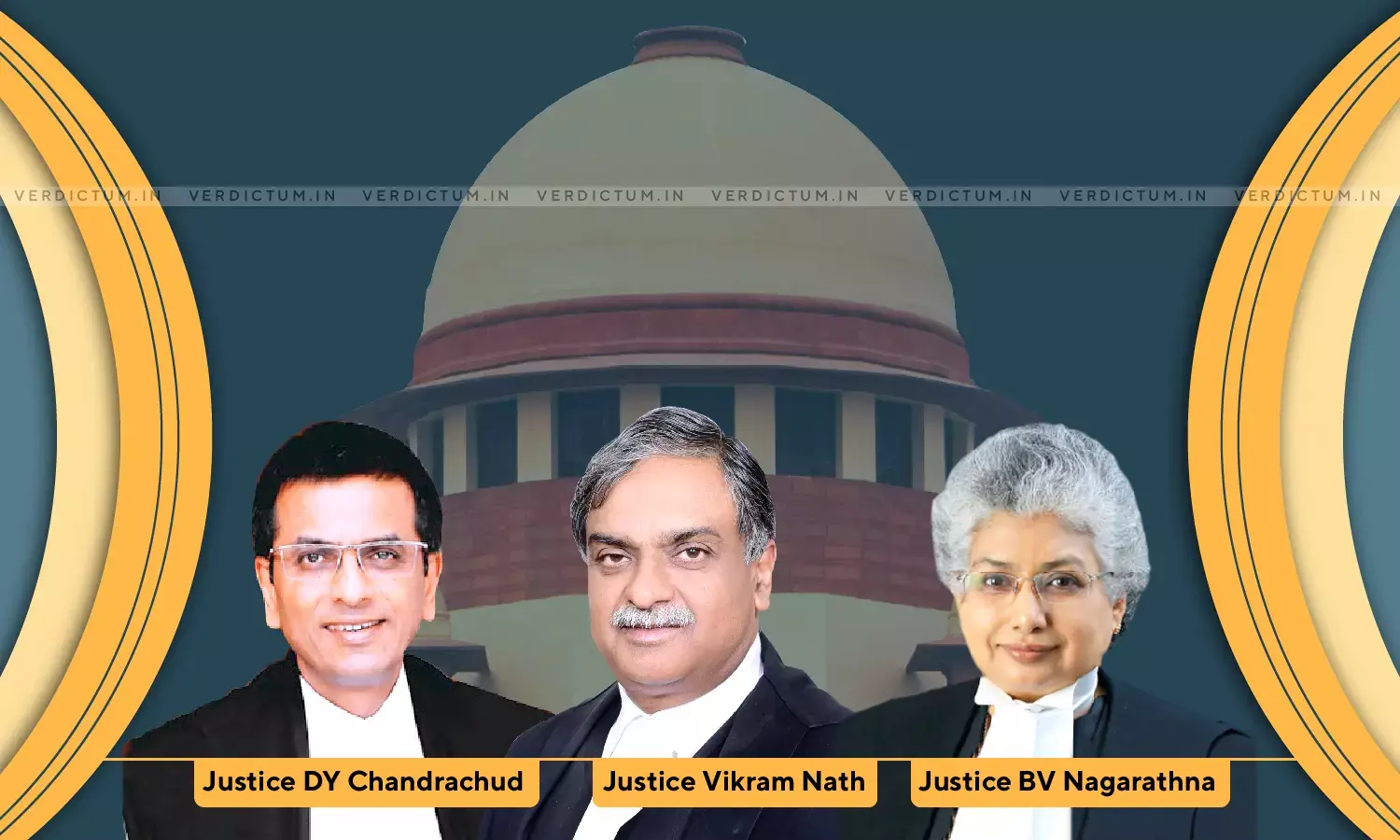NSA Detention- Delay In Deciding Representation Of Detenu And Failure To Communicate Its Outcome Vitiate Detention Order: Supreme Court
A Bench of Justice DY Chndrachud, Justice Vikram Nath and Justice BV Nagarathna has held that the delay in taking a decision on the representation of the detenu and failure of the Central and the State Governments to communicate the rejection of the detenu's representation in a time-bound manner is sufficient to vitiate the order of detention passed under the National Security Act, 1980 (NSA).
The Bench also observed that the delay by the State Government in disposing of the representation and by the Central and State Government in communicating such rejection, strikes at the heart of the procedural rights and guarantees granted to the detenu.
"Article 22(4), in guaranteeing a right to make a representation to the detenu, understandably creates a corresponding duty on the State machinery to render this right meaningful. In Section D.1 of the judgement, we have detailed this Court's settled precedent on the detenu's right to make a representation and for it to be considered expeditiously- failing which the detention order would be invalidated. However, this right would ring hollow without a corollary right of the detenu to receive a timely communication from the appropriate government on the status of its representation- be it an acceptance or a rejection."
In this case, the appellant was detained under the NSA as he was accused of procuring 500 fake Remdisiver injections and administering them to the patient admitted at the City Hospital in Jabalpur. The appellant is the Director of the City hospital in Jabalpur and was arrested in the case based on an FIR. The detention order was issued by the authority for three months and later approved by the State Government. The order was challenged before the High Court which upheld the decision. The appeal was filed against it mainly on the ground that the State Government did not furnish a reply to the representation made by the appellant and that the delay in considering the representation could be fatal to the detention order.
After hearing the arguments, the Bench noted that this history of the framing of Article 22 is critical for the judiciary's evaluation of a detenu's writ petition alleging, inter alia, a denial of the timely consideration of his representation. "We are confining our analysis to the most clinching aspect of this case - the failure of the Central Government and the State Government to consider his representation dated 18 May 2021 in a timely manner", the Court noted.
It further noted that Article 22(5) of the Constitution mandates that
(i) the authority making the order shall "as soon as may be" communicate the grounds on which the order has been made to the person detained; and
(ii) the detaining authority shall afford to the person detained "the earliest opportunity of making a representation against the order"
"Clause 5 of Article 22 incorporates a dual requirement: first, of requiring the detaining authority to communicate the grounds of detention as soon as may be; and second, of affording to the detenu "an earliest opportunity" of making a representation. Both these procedural requirements are mutually reinforcing. The communication, as soon as may be, of the grounds of detention is intended to inform the detenu of the basis on which the order of detention has been made. The expression "as soon as may be" imports a requirement of immediacy."
The Court asserted that the communication of the grounds of detention is in aid of facilitating the right of the detenu to submit a representation against the order of detention. In the absence of the grounds being communicated, the detenu would be left in the dark in regard to the reasons which have led to the order of detention. The importance which the constitutional provision ascribes to the communication of the grounds, as well as the affording of an opportunity to make a representation, is evident from the use of the expression "as soon as may be" in the first part in relation to communicating the grounds and allowing the detenu "the earliest opportunity" of availing of the right to submit a representation.
"Article 22(5) reflects a keen awareness of the framers of the Constitution that preventive detention leads to the detention of a person without trial and hence, it incorporates procedural safeguards which mandate an immediacy in terms of time. The significance of Article 22 is that the representation which has been submitted by the detenu must be disposed of at an early date. The communication of the grounds of detention, as soon as may be, and the affording of the earliest opportunity to submit a representation against the order of detention will have no constitutional significance unless the detaining authority deals with the representation and communicates its decision with expedition."
The Court further stated that, by delaying its decision on the representation, the State Government deprived the detenu of the valuable right which emanates from the provisions of Section 8(1) of having the representation being considered expeditiously. It is necessary to understand that the law provides for such procedural safeguards to balance the wide powers granted to the executive under the NSA.
"The State Government cannot expect this Court to uphold its powers of subjective satisfaction to detain a person, while violating the procedural guarantees of the detenu that are fundamental to the laws of preventive detention enshrined in the Constitution.", the Court held while allowing the appeal by setting aside the judgment of the High Court and quashing the order of detention.
Click Here to Read/Download the Judgment




